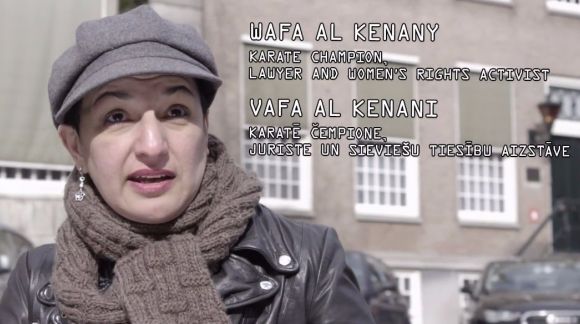Wafa al Kenany was born in Iraq. Inspired by her brother, she started karate training during her teens and went on to become champion of Iraq several times. Because of her political activity directed against the ruling regime, she had to leave her homeland in 1993 and she has now been living in the Netherlands for more than 20 years. Wafa studied law at the University of Amsterdam, is an active advocate of human rights and women’s rights, and continues to practice karate at international level.
“A society can flourish if women and men work together. If men alone dominate society, they can of course succeed in many things, but the success would be 100 times greater if women also participated. This is precisely the reason why I am an advocate for women’s rights,” explains Wafa al Kenany.
In this latest episode of the #mindpower project, the Latvian journalist Eva Ikstena-Strapcāne and Wafa al Kenany read excerpts from Aspazija's paper The Question of Virtue in the play “Lost Rights”. With this speech she concluded the discussion that had been going on in the Latvian press throughout 1894 on her play Lost Rights.
The play is considered to be one of the most outspoken expressions of feminist ideas in Aspazija’s works. Abusing the privileges that fall to him through wealth, power and social standing, the wealthy Langarts seduces Laima, a poor girl unprotected by public opinion. At the end of the play, she shoots Langarts – knowing full well that she is killing a man whom society will never judge – and then shoots herself.
A wide polemic about the double standards of the ruling class, the unenviable position of women in the 1890s and the role of art in exposing these issues started in the press after the premiere of the play. Critics from social democratic circles saw the play as a protest against the rich and mighty and celebrated Aspazija for unmasking social injustice. The conservative press, however, condemned the immorality of the main character and criticised the author for daring to expose the corruption of society.
In reply to these accusations Aspazija emphasised that Latvian girls are not “monsters of emancipation who are capable of thinking”, but “spiritually richly endowed” women who want to become full-fledged members of society. For this reason, she is considered to be the first feminist in Latvian literature, as Aspazija was the first author who dared to speak openly about the state of women in society, about their potential to shape history and their rights to live in accordance with their feelings.
Aspazija’s ideas are topical even today. Gender equality and the rights of women and girls constitute one of the main priorities of the Latvian Presidency in the area of development cooperation policy.
The #mindpower (#domasspēks in Latvian) project is dedicated to the 150th anniversary of the Latvian poets Rainis and Aspazija. It features a collection of 29 short films in which celebrities from all the EU Member States read excerpts from the works of Rainis and Aspazija in their native language. The project is part of the Presidency cultural programme and supported bu the airBaltic airline.
Each week a new video is released on the Presidency's website EU2015.LV. You can also watch the episodes on the Presidency's official Youtube channel and on the project's Facebook page.






